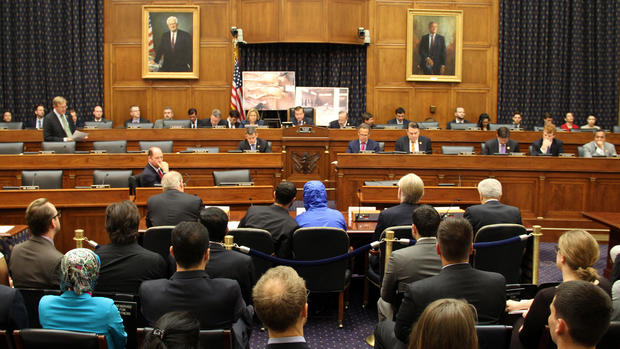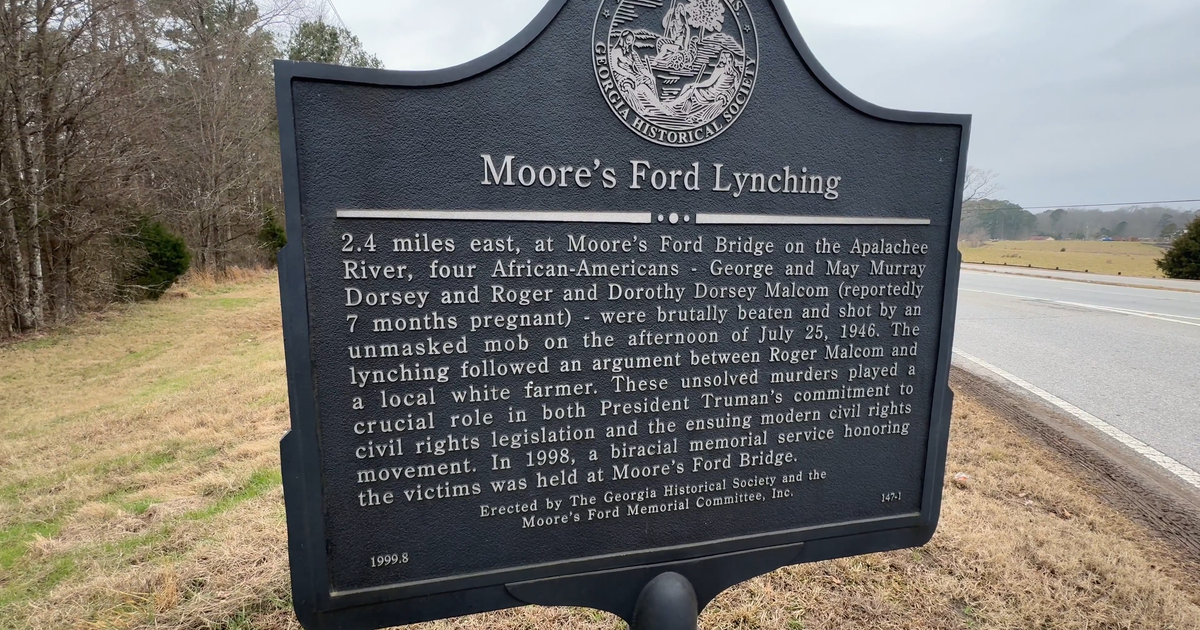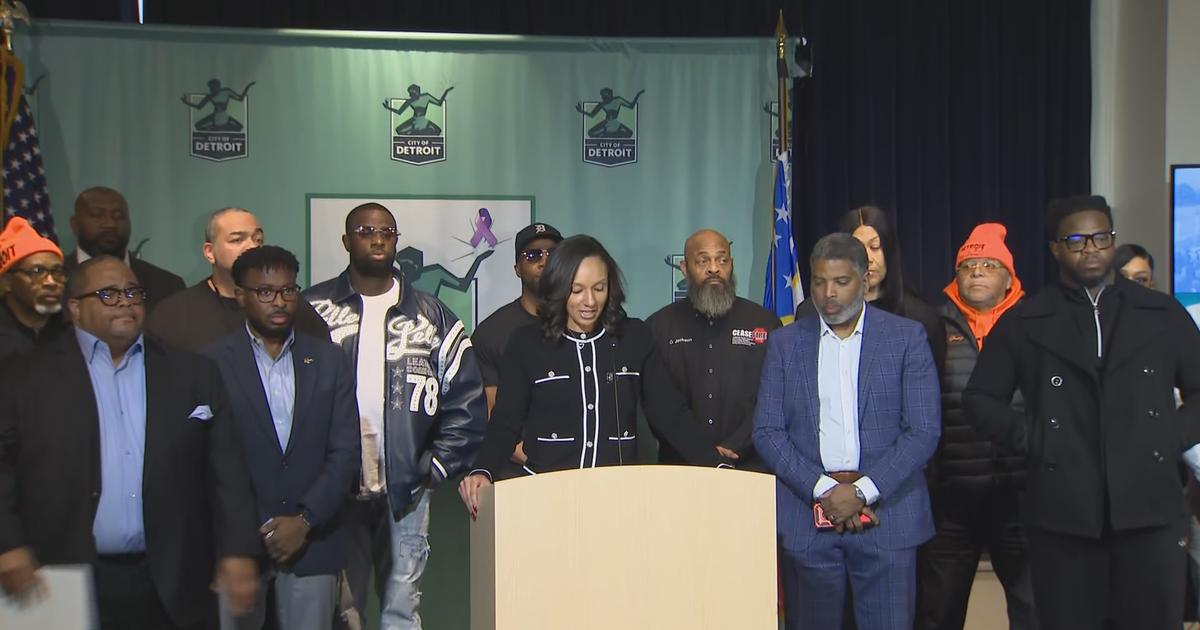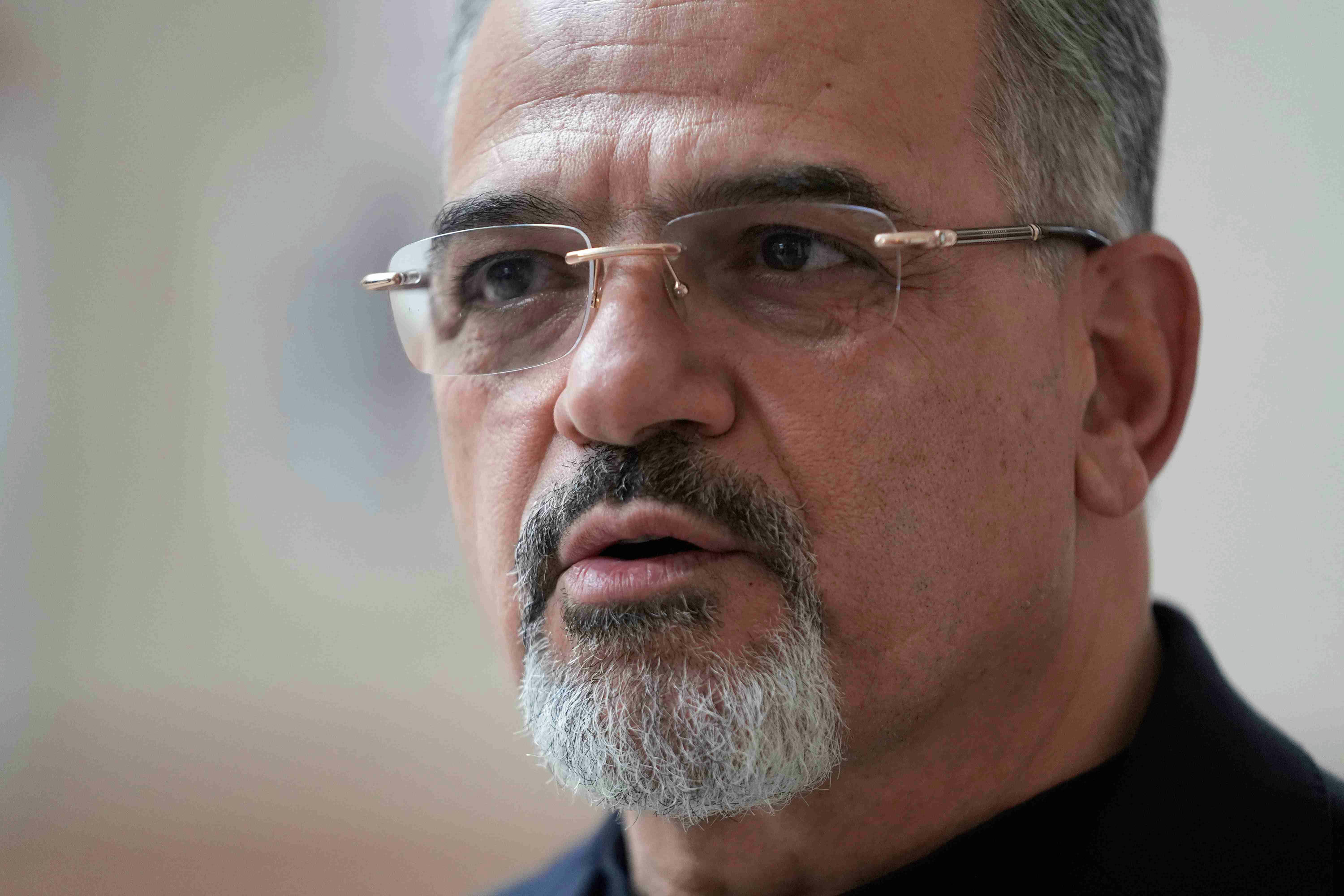An activist shines light on Syria's decade of civil war
When Mouaz Moustafa was a young boy living in Damascus, he one day joked about the sound of Bashar al-Assad's voice. Moustafa's mother stopped him and urged him to whisper. "We would have to whisper that in the home, even if it was a joke," he recalled. "Everyone lived in fear of the state."
- The evidence of Syrian President Bashar Assad and his regime's legacy of war crimes
- A decade of civil war in Syria
Moustafa and the organization he leads are now engaged in an extraordinary task of documenting a devastating civil war. They are collecting evidence— documents, photographs, witnesses, and testimony— that they hope will hold the Assad regime accountable for its alleged crimes in a nearly decade-long civil war. As Executive Director of the Syrian Emergency Task Force, a humanitarian and political advocacy organization, Moustafa is working with a small group of staff to build a case, working with the victims and their families to provide a comprehensive record for ongoing legal cases.
A pseudonymous military photographer, who goes by the alias "Caesar", has provided him with some of the most damning evidence yet: over 50,000 photographs of men, women, and children who were tortured and killed, allegedly at the hands of Assad's military and intelligence branches. The FBI has analyzed 242 of the photographs and determined they contain "no artifacts or inconsistencies."
"The moment that I received the 'Caesar' photos is a moment that I will never forget," Moustafa said. "And the chill that I felt that day I don't think has ever left me."
SYRIAN EMERGENCY TASK FORCE
Moustafa and his family immigrated to the United States when he was 10 years old, settling in Hot Springs, Arkansas. As a young man, he was engaged in public service and received an internship with Democratic Congressman Vic Snyder after graduating college. "I was beyond humbled and honored to work in the halls of Congress," Moustafa told 60 Minutes Overtime.
Mouaz Moustafa was leaving a job as a Senate staffer in early 2011 when the Arab Spring was taking root. He joined a political advocacy group called the Libyan Emergency Task Force, advocating for democracy in Libya, when he heard that protests were happening in Daraa, Syria. Children from a local school had written anti-Assad political graffiti on the walls and were arrested. "They were brutally tortured, some were later killed," Moustafa said. "And it inspired all these people in the southern town of Daraa, where these kids were from, to go out and call for justice for what happened to their children."
On March 15, 2011, a civil uprising had begun in Syria. It would eventually lead to a brutal civil war, that nearly ten years later is still ongoing. Mouaz, in those initial moments, says he felt an urgent need to help the people of his home country. He began working for the Syrian Emergency Task Force (SETF), with the goal of advocating for the rights of Syrians, protecting civilians and facilitating the transition of Syria towards democratic stability.
In the early days of the conflict, Moustafa travelled to Syria, visiting Aleppo, Idlib, Hama and Latakia provinces, to see how SETF could provide support to people in rebel-held areas. They started training and advising civil organizations on the ground and providing direct humanitarian aid, in the form of medicine, flour, and clothes, sometimes having to smuggle it in across the border of Turkey. The humanitarian efforts of The Syrian Emergency Task Force have grown since then. They now run a school for orphans called the Wisdom House in Northern Aleppo, a women's center in Northern Idlib, bakeries that provide bread to people in Idlib, and a no-cost pharmacy at a refugee camp in south Syria, called Hope Pharmacy.
The political work of the organization has introduced them to the highest levels of government. "Our political work is focused on engaging with the White House, National Security Council, State Department, [and] Department of Defense," Moustafa said. The goal of the political work "is to end the killing," he said. "We can bring an end to this never again moment."
The Syrian Emergency Task Force has also developed a mobile application, that provides real-time updates on bombings and artillery attacks, called "Syria Watch."
Today, SETF is primarily engaged in legal work, documenting horrific acts of violence committed against Syrian civilians. Atrocities that SETF says were committed by the Assad regime. They've provided evidence and witnesses to ongoing legal cases, against Assad and members of his regime, in Spain, Germany, Sweden, Norway and France.
WORKING WITH 60 MINUTES
On August 21, 2013, residents of a suburb in Damascus were targeted with a deadly chemical weapons attack. Videos and photos of the attack began surfacing online, showing images of men, women and children gasping for air as the effects of sarin, a deadly chemical agent, took over their bodies and brutally killed them. U.S. intelligence estimates 1,429 people were killed, including 426 children.
Moustafa and the Syrian Emergency Task Force made contact with 60 Minutes producers Nicole Young and Katie Kerbstat Jacobson. The 60 Minutes team wanted to know more about what happened that night.
"Our role was to try to provide as much documentation, videos, pictures and contacts on the ground, to help verify all of the information" Moustafa explained.
He introduced the 60 Minutes team to Kassem Eid, a man who was present that night in August, beating his chest for air as the chemical gas attacked his nervous system. "The rocket hit almost one hundred meters away from the place that I was staying in," Eid told Scott Pelley in a 60 Minutes report. "And within seconds, it just took seconds before I lost my ability to breathe. I felt like my chest was set on fire. My eyes were burning like hell. I wasn't able even to scream or to do anything."
After months of reporting the story with the assistance of Mouaz Moustafa and the Syrian Emergency Task Force, 60 Minutes aired its report, "A Crime Against Humanity" on April 19, 2015.
60 Minutes again worked with Mouaz Moustafa on a story about the Syrian Civil Defense, or "White Helmets" as they are commonly known. Producers Nicole Young and Katie Kerbstat Jacobson wanted to learn more about these volunteer men and women, who rushed into scenes of bombings to pull men, women, and children out from rubble and debris. Videos of the White Helmets' actions spread widely online.
Moustafa said he worked with 60 Minutes to, "connect them to individuals, including the White Helmets…to make sure that they have the White Helmets themselves speaking in their own voice about the work that they do." Scott Pelley interviewed Majd Khalaf, Rady Saad and Raed Saleh of the White Helmets, revealing them to be ordinary citizens—teachers, doctors, and nurses—who stepped up in the face of war to help their besieged communities.
The report "White Helmets" aired on 60 Minutes on December 18, 2016.
"CAESAR"
When Mouaz Moustafa first heard the stories about a military photographer named "Caesar" documenting the torture and killing of civilians at the hands of Assad's forces, he said he was skeptical. Bad information and rumors could sometimes spread in the informal network of contacts he had built in the war-torn country. "You're very critical of all information you receive," he said. "All of the information needs to be verified."
But when photos and documents that "Caesar" and his colleague "Sami" had collected and smuggled out of the country reached SETF's Moustafa, he was floored. "Caesar was able to document almost 55,000 photographs that showed unequivocal evidence of some of the worst crimes against humanity today," he said. "Regular people like you and me…were just emaciated bodies, tortured in horrific, sadistic ways. And nothing to identify them but a number."
In photographs too horrific to broadcast without a masking effect, Caesar's camera captured the dead and emaciated bodies of women, children and the elderly who had allegedly been tortured and killed, using knives, cables, belts and electrocution. Some were even photographed with their eyes gouged out. The photographer held up an index card in some of the photographs to help document the horror he was witnessing.
With Moustafa as translator, "Sami", who helped Caesar upload the photos, told Scott Pelley there are a series of three identifying numbers on the cards in the photographs. "There's usually three numbers …the first being the number of the detainee, the second is the number of the intelligence branch that tortured that individual to death. And the third number was given by the doctor which was a sequential number, signifying which number of dead body he or she was," he translated.
Moustafa said as soon as he received the photographs, he began searching frantically for family members that he says were detained by Assad's air force intelligence branch. "It was just, like a terrible feeling. A feeling of just a cold chill that, every time I think about those photos, it comes back," Moustafa said. "But at the same time, an overwhelming feeling of responsibility."
In July of 2014, Mouaz Moustafa and Caesar would show the world his horrifying photographs in a presentation to the House Foreign Affairs Committee. Caesar came in disguise— he wore a blue Patagonia jacket, dark glasses, and a hat to help shield his face. Moustafa printed out large copies of the photographs, displaying them all around the room. Moustafa translated for Caesar throughout the hearing.
"And I remember that day as I was translating to Caesar," Moustafa said, "these Congress people were sitting in stunned silence, listening to testimony that would shake mountains. [They were] seeing around them photographs that weren't from 1945 or 1994 in Rwanda but were from what's happening today."
When they returned to their hotel after the hearing concluded, Moustafa's phone was ringing with messages and calls from members of Congress and their staff. "Republicans and Democrats from the House Foreign Affairs Committee sat down with me and sat down with Caesar," he said. "That was the beginning of the idea of the Caesar Syria Civilian Protection Act."
CAESAR SYRIA CIVILIAN PROTECTION ACT
On December 20, 2019, the annual U.S. National Defense Authorization Act passed and became law. Included in that legislation was the "Caesar Syria Civilian Protection Act," an act named after Caesar. The act targets the regime of Syrian President Bashar al-Assad and his allies, including Russia, Iran, the militant group Hezbollah, and those that support his regime, with economic sanctions. It requires that the White House report to Congress on all military and non-military options to protect civilians in Syria and provide humanitarian organizations access to financial services, so they can ensure the timely delivery of assistance to Syrians in crisis.
In addition, the State Department is authorized by the act to provide financial assistance to entities conducting criminal investigations, supporting prosecutions, or collecting evidence for eventual prosecution. That aspect of the law he helped craft is "very important for accountability," Moustafa explained.
There are critics who say that the sanctions imposed can have negative impacts on civilians and humanitarian organizations working on the ground in Syria.
Alena Douhan, a United Nations special rapporteur on human rights, voiced concerns that the Caesar Act sanctions could "worsen the existing humanitarian crisis, depriving the Syrian people of the chance to rebuild their basic infrastructure."
"In the past, in other conflicts…sometimes [sanctions] didn't work the way they were intended," Moustafa said. "The [Caesar Civilian Protection Act] has the most stringent humanitarian exceptions of any sanctions legislation that I'm familiar with," Moustafa said in defending the legislation. "When it comes to food, when it comes to medicine, when it comes to humanitarian aid…[civilians] are not hurt."
On the issue of rebuilding conflict-destroyed houses and buildings, activist Mouaz Moustafa is firm in his support of the act and claims the reconstruction process has been corrupted by Assad to restore diplomatic relations. "[Assad] cannot be able to take ownership of that land, rebuild it, and give it to others or exchange it for diplomatic relations," he said. "At the end of the day, that means that Syrian refugees can never return home."
Mouaz Moustafa says "the road to justice and accountability is not a short one" but is hopeful that more witnesses, like Caesar, will come forward and provide further evidence for future prosecutions. He says the Syrian Emergency Task Force has established a victims' fund for "other potential Caesars" to encourage them to come forward and receive support from their organization.
"Our work to document the war crimes in Syria will continue. Our work to help-- individuals, heroes like Caesar and others, will never cease," Mouaz Moustafa told 60 Minutes Overtime. "And as long as Caesar and the Syrian people are resilient justice will prevail."
The video above was produced by Will Croxton and Mabel Kabani. It was edited by Will Croxton.
Footage of Mouaz Moustafa in Syria and Washington, D.C. courtesy of Spark Media, from the film "Red Lines"




